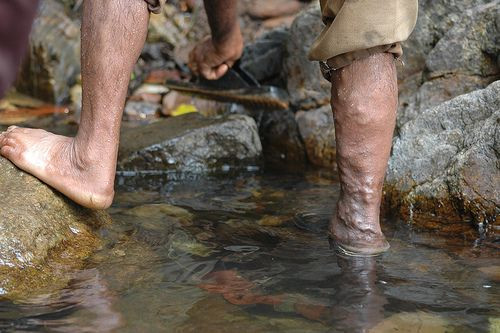Researchers Target Single Protein Responsible For Varicose Veins

A single protein is responsible for causing varicose veins, a new study finds.
A specific protein, AP-1, triggers the production of several molecules promoting stretching of the vessel walls, the study by researchers at Heidelberg University found.
The study was led by Dr. Thomas Korff and Prof. Markus Hecker at the University's Institute of Physiology and Pathophysiology. It was published in the journal FASEB.
Mice Ear Study
Using an animal model, Korff and his team looked at blood vessels in a mouse’s ear which are easily visible and accessible for minor procedures, simulating how the varicose veins start. The researchers tied off a vein with a thin thread, the elevated pressure in the vessels caused recognizable pooling of blood similar to varicose veins.
In addition production of MMP-2 an enzyme that breaks down non-cellular components of connective tissue of the blood vessels, increased.
Arteries, Varicose Veins Share Similar Mechanisms
Dr. Korff explains "the cellular mechanisms that control the formation of varicose veins appear to be similar to mechanisms that orchestrate the remodeling of arteries in patients with high blood pressure."
The researcher points out transcription factor AP-1, a protein that activates genes that produce filling pressure in the blood vessels has similar characteristic as the controls for varicose veins. If the AP-1 protein is inhibited then varicose veins will not form and production of enzymes that breakdown connective tissue will remain normal.
Mouse and Human Varicose Veins Similar
Dr. Korff’s team compared tissue from the mouse study to varicose vein tissues from human patients.
The team found varicose veins that have been surgically removed from patients exhibited the same cellular and molecular changes as the varicose veins created artificially in the mouse ear.
"Using our model, we can now more precisely analyze the early stages of the disorder and test possible drugs for their ability to prevent varicose vein formation, which, as a result, may improve the quality of life of afflicted patients, said Korff."
Varicose Veins Details
Varicose veins are swollen, twisted, and sometimes painful veins that have filled with an abnormal collection of blood. They develop when valves in the veins that allow blood to flow toward the heart stop working properly. As a result, blood pools in the veins and causes them to get larger. Varicose veins affect 1 out of 2 people over age 50. They are more common in women than men, according the National Institutes of Health.
Published by Medicaldaily.com



























